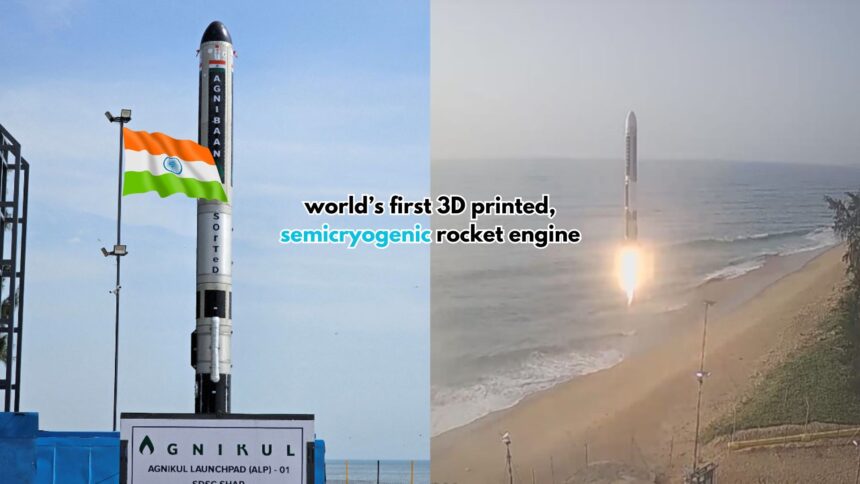IIT Madras Startup Agnikul Cosmos Launches World’s First 3D Printed Rocket IIT Madras-incubated startup, has successfully launched the world’s first 3D printed rocket Agnikul Cosmos: Launching the World’s First 3D Printed Rocket In a landmark achievement that underscores the growing prowess of India’s space technology sector, Agnikul Cosmos, an IIT Madras-incubated startup, has successfully launched the world’s first 3D printed rocket. This pioneering feat not only highlights the innovative capabilities of Agnikul but also marks a significant milestone in the global aerospace industry.
IIT Madras Startup Agnikul Cosmos Launches World’s First 3D Printed Rocket
The Genesis of Agnikul Cosmos
Agnikul Cosmos was founded in 2017 by Srinath Ravichandran and Moin SPM, both of whom share a deep passion for democratizing space access. With support from IIT Madras and its Research Park, Agnikul has been able to leverage state-of-the-art facilities and a robust network of mentors and industry experts to drive its mission forward.
Innovation at the Core: The 3D Printed Rocket
At the heart of this groundbreaking launch is the Agnibaan rocket, designed to be highly modular and capable of carrying payloads up to 100 kg to low Earth orbit (LEO). What sets Agnibaan apart is its revolutionary 3D printed engine, Agnilet, which is produced as a single piece. This engine represents a significant leap in manufacturing technology, reducing complexity, production time, and costs while enhancing reliability and performance.
The decision to use 3D printing technology was driven by the need for precision and efficiency. Traditional rocket engines are composed of numerous parts that require meticulous assembly. By contrast, Agnilet’s single-piece construction eliminates the need for joints and welds, which are potential points of failure. This innovation not only improves the engine’s robustness but also simplifies the entire production process.
The Launch: A Historic Achievement
The successful launch of the Agnibaan rocket, featuring the 3D printed Agnilet engine, is a testament to Agnikul’s commitment to pushing the boundaries of space technology. This event marks the first time a rocket with a fully 3D printed engine has been launched, setting a new benchmark for the aerospace industry.
The launch was conducted from the Sriharikota spaceport, under the auspices of the Indian Space Research Organisation (ISRO). This collaboration underscores the supportive ecosystem in India for space startups, fostering innovation and enabling ambitious projects like those of Agnikul Cosmos to come to fruition.
Implications for the Future
The implications of this successful launch are profound. By demonstrating the viability of 3D printed rocket engines, Agnikul Cosmos has paved the way for more cost-effective and flexible launch solutions. This breakthrough is particularly significant for the small satellite market, which is experiencing rapid growth and demands more affordable and responsive launch options.
Moreover, the use of 3D printing technology in rocket manufacturing can lead to significant reductions in lead times and production costs, making space access more affordable for a wider range of customers, from commercial enterprises to academic institutions.
Support from IIT Madras
The role of IIT Madras in Agnikul’s journey cannot be overstated. The institute’s incubation program has provided Agnikul with crucial resources, including access to advanced research facilities, expert mentorship, and a collaborative environment that fosters innovation. This support has been instrumental in helping Agnikul achieve its ambitious goals.
Conclusion
Agnikul Cosmos’s successful launch of the world’s first 3D printed rocket engine marks a watershed moment in the history of space exploration. It exemplifies the innovative spirit and technological prowess that are hallmarks of IIT Madras and its incubated startups. As Agnikul continues to break new ground, it is poised to play a pivotal role in making space more accessible and affordable, heralding a new era of exploration and discovery.
For more information about Agnikul Cosmos and their groundbreaking work,
visit their official website. IIT Madras
References:
Economic Times
IIT Madras Research Park
Agnikul Cosmos Official Website
Homemade Ginger Beer: Ghar Par Banane Ki 3 Easy Recipe aur Fayde click here

